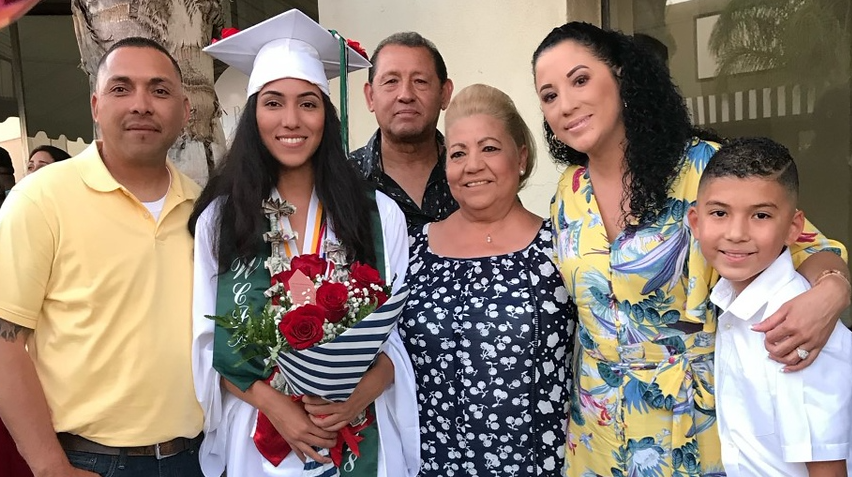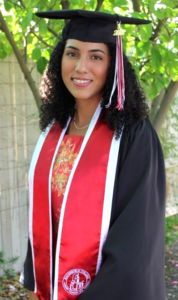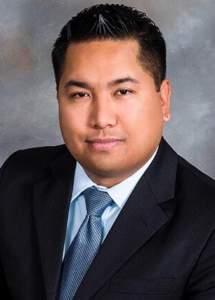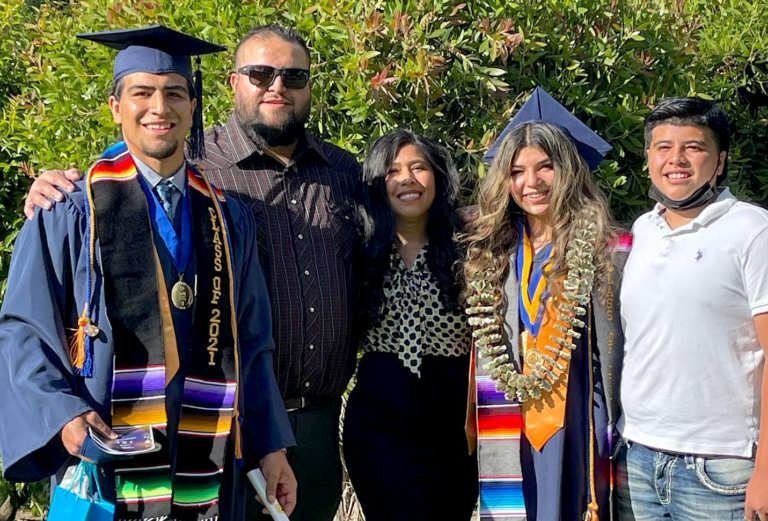Dual Enrollment Success Stories: Celeste Galvan of McFarland
 Celeste Galván of McFarland and her family celebrated her two degrees earned by the age of 19 thanks to dual enrollment courses through Bakersfield College before Fresno State. Here they pose with her at her high school graduation in 2018. She is now enrolled in CSU Bakersfield’s teacher credential program. All three campuses are CVHEC members.
Celeste Galván of McFarland and her family celebrated her two degrees earned by the age of 19 thanks to dual enrollment courses through Bakersfield College before Fresno State. Here they pose with her at her high school graduation in 2018. She is now enrolled in CSU Bakersfield’s teacher credential program. All three campuses are CVHEC members.
CVHEC Dual Enrollment Spotlight:
Celeste Galván of McFarland
BY TOM URIBES
CVHEC Communications/Media Coordinator
From one end of the valley to the other, the Central Valley Higher Education Consortium continues to spotlight student dual enrollment success stories.
Like Nataly Frias featured in our first story in September, Celeste Galván of McFarland earned an associate degree at age 17 before she even graduated high school, marching alongside thousands of other Bakersfield College students at the commencement ceremony in Memorial Stadium in 2018.
Then just two years later, after transferring to Fresno State, she earned a bachelor of arts degree in Liberal Studies in May and now, at age 19, she is enrolled in the credential program at California State University, Bakersfield while serving an teacher internship at a nearby elementary school. All three institutions are CVHEC members.
In high school, Celeste participated in a Bakersfield College pilot program at the Wonderful College Prep Academy in nearby Delano that provided students with the opportunity to complete an associate of science in agriculture business from BC by the time they graduated from high school.
Before her senior year, Celeste’s family moved to Bakersfield and she chose to stay with her grandmother in McFarland to finish her BC degree work with the Wonderful Academy.
A typical day for Celeste would start at 4 a.m. to get ready for practice with the cross country team, where she took second place at the CIF Central Section Championships in Woodward Park in 2015. After classes, she would stay at the school library as late as 8 or 9 p.m. to finish her college and high school classwork since she didn’t have access to wifi at her grandmother’s house.
Celeste rode that Renegade/Bulldog/Roadrunner spirit through Bakersfield College, Fresno State and back to CSUB.
Romeo Agbalog, president of the Kern Community College District Board of Trustees, wrote in a Bakersfied.com op-ed in January that the success of Celeste and other students prepared Bakersfield College to scale up its model by launching the Early College program in 2019, with the vision of providing a pathway for every high school student in Kern County to earn between 12 and 60 units of college credit before graduation.
“Every incoming freshman at McFarland High School is enrolled in college-level courses alongside their regular classwork, developing the tools for college and career readiness. Today, over 23,000 students have completed a total of approximately 90,000 college credits at 36 high schools across the county” said Agbalog who also noted the program is successful in closing equity gaps.
“Early College has had a 93 percent student success rate across all high school campuses in the last academic year, consistently exceeding BC’s own institution-set standard for student success by 15 to 20 percent,” he wrote. “Most importantly, more than 85 percent of students from rural areas who were in an associate degree completion pathway went to college after high school.”
See Trustee President Agbalog’s column.
Background:
The Central Valley Higher Education Consortium has been playing an increasing role in furthering Dual Enrollment as an equity-driven strategy to reduce disparities in student persistence and completion rates, which is the essence of the CVHEC mission, including
the creation of a task force in 2019, the Central Valley Dual Enrollment for Equity and Prosperity (CVDEEP).
With over 60 education leaders from the CVHEC region, CVHEC’s Central Valley Dual Enrollment for Equity and Prosperity (CVDEEP) Task Force is identifying and establishing the best elements of a sustainable strategy for dual enrollment that is intentional and aligns with Guided Pathways.
Made up of representatives from Central Valley K-12 districts, colleges, and universities, the task force developed a collaborative regional accord on an equitable delivery of dual enrollment, culminating in a Central Valley Higher Education Consortium white paper in July 2020, “Dual Enrollment in the Central Valley.”
This consensus framework document is designed to assist the nine-county region in the advancement of dual enrollment by reviewing where it has been, identifying the bright spots, identifying challenges and working together to develop solutions.
CVHEC efforts focus on policy implementation and delivery of support to faculty and administrators working on these efforts. The work focuses on regional strategic scaling of Guided Pathways; math pathways; corequisite support (AB 705 and EO 110 implementation); California College Guidance Initiative; and dual enrollment as strategies for equity and degree attainment.
CVHEC will continue to highlight stories about dual enrollment students like Celeste and Nataly in its e-newsletter, and social media platforms. Also, a showcase video conveying the value of dual enrollment for all students through the stories of individual valley students is currently in production and due to be released later this fall semester.
For CVHEC media inquiries, contact Tom Uribes at cvheccommunications@mail.fresnostate.edu or text 559.348.3278.











